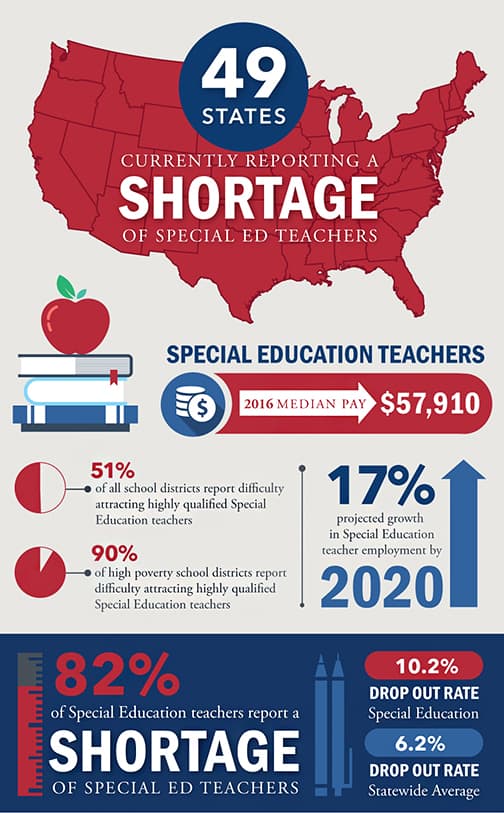Have a question? We are here to help.
Our advisors are available Monday through Friday from 8:00 a.m. – 5:00 p.m. ET.
Email Us
Our advisors look forward to answering your questions.
It’s no surprise that 49 states report a shortage of Special Education teachers, and 82% of exceptional children teachers report that there are not enough professionals to meet the needs of students with disabilities and IEPs.
If you want to become an exceptional children – general curriculum teacher in North Carolina, look no further than North Carolina Teachers of Tomorrow. The North Carolina Teachers educator preparation program will get you fully licensed to teach exceptional children – general curriculum, either one-on-one or teaching in a classroom of developmentally delayed students.
Elementary and secondary exceptional children – general curriculum teachers build lesson plans based on their assessment of each of their students’ needs. Individualized Education Programs (IEPs) are central to this process. Each student has their own specific set of needs and circumstances, and the IEP serves as a road map to track the student’s progress, informing the strategy behind how supervising teacher assistants, group activity, one-on-one instruction, and parents come together to assist the student in accomplishing their goals toward progress in the classroom.
The exceptional children – general curriculum teacher works in conjunction with general education teachers, as well as counselors and administrators, to further the goals set forth in a student’s IEP. As each student’s educational steward, the exceptional children – general curriculum teacher updates the IEP throughout the year to reflect their progress and goals. The IEPs you create for students will collectively determine how you structure your classroom. The North Carolina Teachers of Tomorrow training program will teach you how to create effective individualized education plans based on the state standards. Once the IEPs have been established, the exceptional children – general curriculum teacher works with students and parents to carry them out.
Are you ready to learn more about becoming an exceptional children – general curriculum teacher in North Carolina? Apply for free and one of our expert program advisors will contact you to help you develop a personalized path to licensure!
apply nowThe North Carolina Teachers of Tomorrow program is approved by the North Carolina Department of Public Instruction to certify teachers in exceptional children – general curriculum. All you need is a bachelor’s degree in any major with a 2.7 GPA to get started. We will need a completed application and official transcripts to admit you into the program.
After being admitted to our program, you will complete innovative, engaging online training, and teacher observations to get you ready for the classroom. The North Carolina Teachers of Tomorrow program provides extensive training in pedagogy, allowing teachers of exceptional children – general curriculum to gain all of the skills and knowledge necessary to become an effective teacher before ever stepping foot in the classroom. Throughout the training you will observe the classrooms of veteran teachers of exceptional children and complete projects to expand upon that field experience.
Candidates for an exceptional children – general curriculum licensure will take the following exams:
Leading test preparation materials are provided on our Study Resources page.
During your first year of teaching, also known as the Residency Year, you will receive full pay and benefits. The Residency Year provides the opportunity to work directly with children and lead your own classroom while also having help from your assigned Field Supervisor, a veteran educator with more than 15 years of experience in education.
Upon successful completion of your residency year and program requirements, you will become a fully licensed teacher. Teachers of exceptional children – general curriculum are in very high demand in North Carolina. Make a difference in the lives of students in your community by becoming a licensed teacher today.
Get StartedThe National Association of Special Education Teachers (NASET) provides additional support specifically for prospective teachers of Exceptional Children. Their website provides valuable resources such as their Classroom Management Series publication, video lectures and much more.
apply now